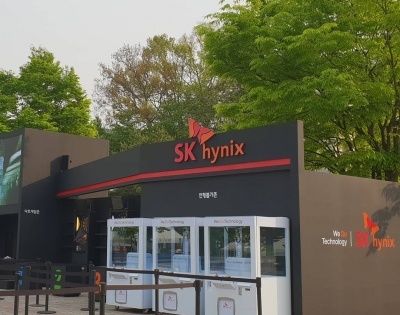Samsung, SK hynix stocks down amid memory demand slowdown concerns
By IANS | Published: August 12, 2021 10:33 AM2021-08-12T10:33:03+5:302021-08-12T10:45:08+5:30
Seoul, Aug 12 Shares in Samsung Electronics and SK hynix Inc South Korea's two largest chipmakers ...

Samsung, SK hynix stocks down amid memory demand slowdown concerns
Seoul, Aug 12 Shares in Samsung Electronics and SK hynix Inc South Korea's two largest chipmakers plunged amid concerns of a slowdown in memory demand, analysts said on Thursday.
Samsung was trading at 77,600 won ($67) after a 1.15 percent decline, while SK hynix slipped 3.79 percent to 101,500 won on Thursday morning.
On Wednesday, Samsung shed 2.1 percent to close at 78,500 won, moving under the 80,000 mark for the first time since Aug. 2.
SK hynix finished at 105,500 won after losing 6.2 percent, its sharpest fall since March 2020 when the market was hit by the COVID-19 outbreak.
Analysts said the plunge came as investors fear a price decline of DRAM with sluggish demand after the current quarter, reports Yonhap news agency.
Samsung and SK hynix are the world's two largest DRAM makers, having a combined market share of more than 70 percent in the first quarter of the year, according to market researcher TrendForce.
TrendForce earlier expected contract prices of PC DRAM to decline by 0-5 percent in the fourth quarter of 2021.
The industry tracker also predicted contract prices of server DRAM to be "constrained to rise further" in the fourth quarter.
"On the whole, the general behaviours of DRAM buyers with regards to procurement have changed noticeably form the first half of this year," it said. "As the demand related to servers, PCs, and other major applications slows down, the whole DRAM market will gradually shift to a state of oversupply."
With negative outlooks coming out, some analysts even lowered target stock prices of the chipmakers.
However, others said the price decline and possible down cycle in the memory market may not be long compared with the past.
"Major memory producers' inventory levels are less than a week, while production bottlenecks are deepening," said Lee Jae-yun, an analyst at Yuanta Securities.
"It means that the market is not likely to repeat long price adjustments that we saw between the fourth quarter of 2018 and the fourth quarter of 2019. It could rebound from the third quarter of 2022 at the latest."
Disclaimer: This post has been auto-published from an agency feed without any modifications to the text and has not been reviewed by an editor
Open in app